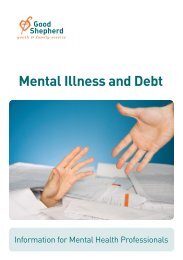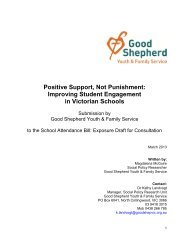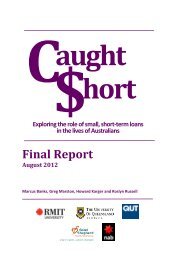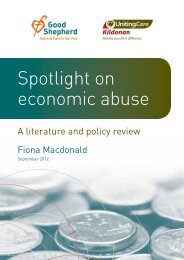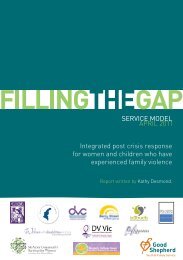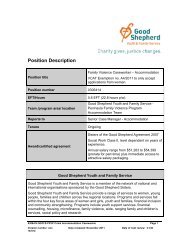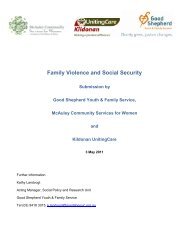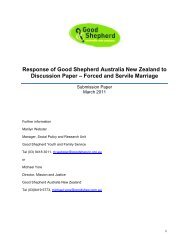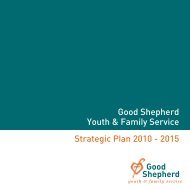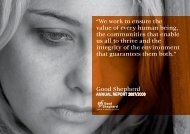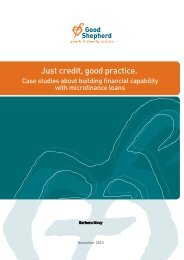Spotlight on economic abuse - Good Shepherd Youth & Family ...
Spotlight on economic abuse - Good Shepherd Youth & Family ...
Spotlight on economic abuse - Good Shepherd Youth & Family ...
Create successful ePaper yourself
Turn your PDF publications into a flip-book with our unique Google optimized e-Paper software.
insufficient to meet costs for women who have to re-establish a home and who may have<br />
legal, medical and other costs as well as debts arising from ec<strong>on</strong>omic <strong>abuse</strong> and other<br />
domestic violence (Braaf & Barrett Meyering 2011).<br />
In recent years welfare reforms in Australia have been aimed at reducing ‘welfare<br />
dependency’ through increased c<strong>on</strong>diti<strong>on</strong>ality of payments and increased requirements <strong>on</strong><br />
people—including women with young children—to look for and engage in paid work as a<br />
c<strong>on</strong>diti<strong>on</strong> of eligibility for payments. While women who have experienced domestic violence<br />
can apply for a temporary exempti<strong>on</strong> from job search and other activity requirements (DHS<br />
2011) the experiences of the women in Braaf and Barrett Meyering’s (2011) study indicate<br />
that this exempti<strong>on</strong> may not be secured by many women. They report that n<strong>on</strong>e of the<br />
women in their study raised the exempti<strong>on</strong> although the women were worried about their<br />
ability to comply with ‘welfare to work’ requirements due to lack of childcare, health issues,<br />
trauma and <strong>on</strong>going time commitments dealing with legal, medical and other matters. Some<br />
service workers in the study reported that the exempti<strong>on</strong> is extremely difficult to gain.<br />
Other researchers and policy analysts have expressed c<strong>on</strong>cerns that ‘welfare to work’<br />
initiatives are likely to increase marginalisati<strong>on</strong> of women who have experienced domestic<br />
and family violence (Murray & Powell 2008). These are c<strong>on</strong>cerns which echo those<br />
expressed by researchers in the United States where there has been a l<strong>on</strong>ger experience of<br />
welfare reform characterised by temporary assistance and a focus <strong>on</strong> workforce participati<strong>on</strong><br />
(Tolman 2011). In that country there remain c<strong>on</strong>cerns that women may become more<br />
dependent <strong>on</strong> abusive partners because of reduced opti<strong>on</strong>s for leaving relati<strong>on</strong>ships and<br />
also that the impacts of violence might limit women’s ability to comply with the welfare<br />
system’s work requirements (Tolman 2011).<br />
In Australia the interacti<strong>on</strong> of the income support system and employment does not always<br />
support women’s l<strong>on</strong>g-term financial security as there can be few incentives to gain<br />
employment, including because increasing part-time work hours can result in a loss of<br />
overall income and in loss of access to benefits such as a Healthcare Card (ADFVC 2010).<br />
Further, recent changes restricting eligibility for parenting payment to parents with younger<br />
children are still to take full effect and this will see increasing numbers of sole parents with<br />
young children reliant <strong>on</strong> the lower levels of income support provided through Newstart<br />
payments made to job-seekers. Thus, while income support should be a positive sec<strong>on</strong>dary<br />
or tertiary interventi<strong>on</strong> for families by providing protecti<strong>on</strong> against poverty, low levels of<br />
payments and c<strong>on</strong>diti<strong>on</strong>ality may leave women ill-equipped to become ec<strong>on</strong>omically secure<br />
at a time when they may also face multiple barriers to gaining security through employment<br />
participati<strong>on</strong>.<br />
A recent initiative has extended the provisi<strong>on</strong>s for people receiving Centrelink payments to<br />
opt for payments to be made <strong>on</strong> a weekly rather than fortnightly basis (DHS 2012, accessed<br />
7 July 2012 at ). This kind of flexibility has been seen<br />
as important for women experiencing family violence who may be managing a range of<br />
financial demands—as has the opti<strong>on</strong> for advance payments—and and there have been<br />
calls for these to be made more widely available (<strong>Good</strong> <strong>Shepherd</strong> <strong>Youth</strong> & <strong>Family</strong> Service,<br />
McAuley Community Services for Women & Kild<strong>on</strong>an UnitingCare 2011).<br />
There is an identified gap in regard to income support for women exiting domestic or family<br />
violence who may be ineligible for income support payments, including for Special Benefit<br />
which is provided to people in severe hardship but which is means and asset-tested. It has<br />
been argued that domestic and family violence should be included am<strong>on</strong>g the eligibility<br />
criteria for this payment (<strong>Good</strong> <strong>Shepherd</strong> <strong>Youth</strong> & <strong>Family</strong> Service 2011). In additi<strong>on</strong>, women<br />
who are migrants and have arrived in Australia <strong>on</strong> a spouse visa may be ineligible to access<br />
income support payments <strong>on</strong> separating from a partner following domestic violence and they<br />
may also not be permitted to work. While a woman may be able to claim the Special Benefit,<br />
29



